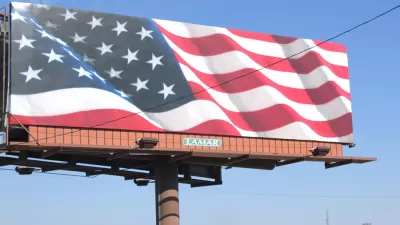Planners typically pay attention to the Supreme Court when a Fifth Amendment case, like Kelo v. New London, comes along. The recent McCutcheon decision is a case in which the court could have paid attention to planners.

The United States Supreme Court could take a cue from a billboard.
I don't mean a particular billboard. One reading, "Political Donations Undermine Democracy" might be nice, of course. But I mean any billboard.
Much like Citizens United before it, the recent McCutcheon v. Federal Election Commission decision, which effectively undid the dollar limits on donations to political parties, was principled in part on the notion that more speech equals more democracy. If many ideas are in the "marketplace of ideas," as described by political philosopher John Stuart Mill, then consumers – i.e. voters – can choose those that seem most sensible.
Mill presumably wrote On Liberty on paper. Despite the utter reasonableness of his ideas, he never had to consider what the marketplace looks like when it is outshined by a looming image of, say, LeBron James, T.J. Eckleburg, or Frank Underwood blaring across miles of the night sky.
Cities have long been wary of this sort of visual blight and have enacted regulations to combat it. Quaint refuges such as Aspen and Carmel hardly let stores proclaim their own names in their downtowns. Some places require hanging wood signs, to invoke images of an America long past. Large cities keep a close eye on the billboards and mega-graphics that have turned vertical space into valuable real estate.
Though American governments cannot regulate the content of speech, except in extreme circumstances (such as libel or profanity), the Supreme Court has held that they may regulate the “time, place, and manner” in which speech is conveyed. Restrictions on advertising are usually justified so long as they “advance the public health, safety, peace, comfort or convenience.” This ability dates back at least as far as the Euclid decision of 1926, which first codified cities’ rights to control land use in order to promote general welfare. This includes, of course, the avoidance of visual blight in public spaces.
(It’s worth noting that, not surprisingly, some groups contend that the First Amendment does protect billboard-speech; they also contend that limitations on billboards constitute unfair takings, prohibited by the Fifth Amendment.)
Regulation of public advertising can go both ways, of course. In Times Square, New York City planners have deliberately embraced the idea that advertising can be a form of theater. On the West Coast, boosters of downtown Los Angeles are keeping an anxious eye on the Wilshire Grand. As part of a complex development deal with the city, it will be the first skyscraper in Los Angeles to have animation and illuminated graphics. L.A. City Council members justified the deal by referring to the planned illumination as “art.”
Interestingly, the Wilshire Grand project broke ground soon after the city pulled the plug on some 82 digital billboards operated by Clear Channel Outdoor. In April of last year, a Superior Court judge agreed with the city when it ruled that the billboards had been converted to digital displays illegally. They went dark almost instantly.
Even the most ardent civil libertarian has to see the logic of these restrictions, including those that confine truly stentorian advertising to a single district. In a city, the skyline is the classic public good: something that should be equitably available to everyone under all circumstances. Coca-Cola may not tell me to "Enjoy" if doing so floods my apartment with light, distracts me from the road, or covers up an aesthetically pleasing view. There's a reason that there aren't any billboards in front of the White House, Old Faithful, or, um, the Hollywood Sign.
All of this illustrates a truth that is obvious to any urban planner but that has, apparently, gotten lost in the post-Citizens and now post-McCutcheon world. Taken literally, the Constitution protects the ability of people to speak – literally – to convey the ideas, emotions, and information that they see fit. Naturally, "speaking" can't comprise only vocal expressions. With that said, it's useful to think like a planner here. Consider the role of the individual as he or she occupies public space: billionaires and beggars are each due only as much space as their bodies can claim. I imagine that the framers had in mind things like town hall meetings. Imagine if the Koch brothers had to wait for their turn at the podium.
The thing about free speech is that it's most free at modest volumes. Whatever the differences between political and commercial speech may be, this should not be one of them.
The marketplace cannot be so loud that we all run from it screaming, leaving the hawkers to bargain among themselves. Not every block must blare like Times Square does. Likewise, I may not voice my support for an Ayn Rand-Ralph Nader ticket for the presidency by yelling out all 1455 combined pages of Atlas Shrugged and Unsafe at Any Speed, drill sergeant-style, within three inches of my neighbor's ear.
What the Supreme Court seems not to understand is that money is not an idea, emotion, or piece of information. In the case of McCutcheon, what is money but a “manner” of speech? It certainly isn’t content. It is volume, deafening. It is brightness, blinding.
To put it in planning terms: McCutcheon puts Times Square on every street corner.

Maui's Vacation Rental Debate Turns Ugly
Verbal attacks, misinformation campaigns and fistfights plague a high-stakes debate to convert thousands of vacation rentals into long-term housing.

Planetizen Federal Action Tracker
A weekly monitor of how Trump’s orders and actions are impacting planners and planning in America.

San Francisco Suspends Traffic Calming Amidst Record Deaths
Citing “a challenging fiscal landscape,” the city will cease the program on the heels of 42 traffic deaths, including 24 pedestrians.

Defunct Pittsburgh Power Plant to Become Residential Tower
A decommissioned steam heat plant will be redeveloped into almost 100 affordable housing units.

Trump Prompts Restructuring of Transportation Research Board in “Unprecedented Overreach”
The TRB has eliminated more than half of its committees including those focused on climate, equity, and cities.

Amtrak Rolls Out New Orleans to Alabama “Mardi Gras” Train
The new service will operate morning and evening departures between Mobile and New Orleans.
Urban Design for Planners 1: Software Tools
This six-course series explores essential urban design concepts using open source software and equips planners with the tools they need to participate fully in the urban design process.
Planning for Universal Design
Learn the tools for implementing Universal Design in planning regulations.
Heyer Gruel & Associates PA
JM Goldson LLC
Custer County Colorado
City of Camden Redevelopment Agency
City of Astoria
Transportation Research & Education Center (TREC) at Portland State University
Jefferson Parish Government
Camden Redevelopment Agency
City of Claremont





























